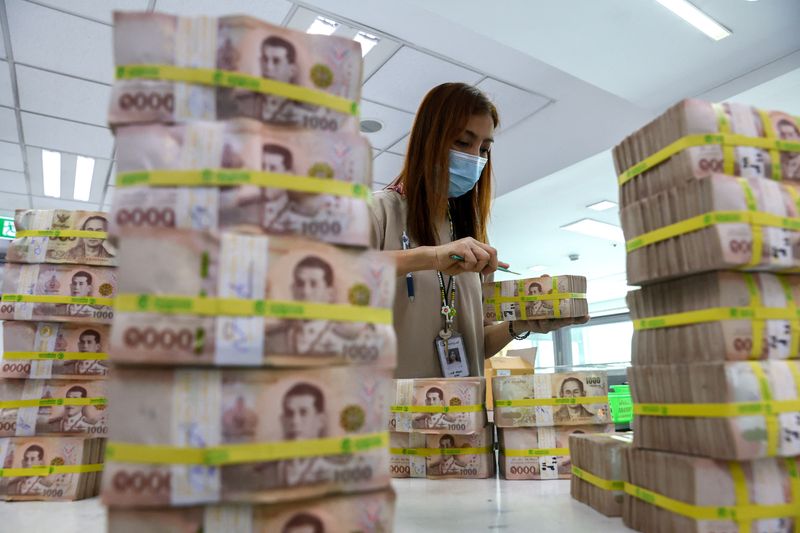 © Reuters. A bank employee gathers Thai baht notes at a Kasikornbank in Bangkok, Thailand, January 26, 2023. REUTERS/Athit Perawongmetha/File Photo
© Reuters. A bank employee gathers Thai baht notes at a Kasikornbank in Bangkok, Thailand, January 26, 2023. REUTERS/Athit Perawongmetha/File Photo
By Devayani Sathyan and Vuyani Ndaba
BENGALURU/JOHANNESBURG (Reuters) - Emerging market currencies will take well into next year to start making noticeable gains against a retreating U.S. dollar, despite a growing view the interest rate cycle has peaked, a Reuters poll of FX strategists showed.
After getting battered for most of 2023, emerging market (EM) currencies have made modest gains against the dollar after the Federal Reserve held interest rates steady last week and data suggested the U.S. economy might finally be slowing.
That dollar weakening trend was likely to hold in the near-term as a majority of analysts in the Nov. 3-7 Reuters poll expected the dollar to trade lower by year-end.
However, with most EM central banks expected to follow the Fed and cut rates next year, their respective currencies were unlikely to recoup double-digit losses they have accumulated over the past couple of years.
"We've seen already some pretty sharp gains last week, but the recent gains aren't extending because there is still uncertainty about the Fed ... and at the same time the U.S. is still performing better than most other economies," said Mitul Kotecha, Head of FX & EM Macro Strategy Asia at Barclays.
"So it's difficult to see the EM currencies recoup some of the sharp losses that we've seen in the last few months. That said, we do expect some gains, it's just going to be a bit more of a gradual path."
This excludes the Russian rouble, which has lost 27% this year, and the Turkish lira, which is down 52%.
Only a few Asian currencies, such as the Indian rupee, Thai baht, and South Korean won were expected to recoup their losses by late 2024. In the near term, the rupee is forecast to trade in a narrow range.
Although EM currencies gained at the beginning of 2023 and investors brimmed with positivity after China's post-COVID reopening, economic performance in the world's second largest economy has been mostly underwhelming.
Indeed, the tightly-controlled Chinese yuan was forecast to only recoup slightly more than half of its 2023 losses. It has fallen over 5% this year.
The South African rand is set to gain less than 1% while the Turkish lira is set to fall around 16% in a year.
Latin America's stand-out currencies, the Brazilian real and Mexican peso, have gained around 8% and 11% respectively since the year began, although some of their central banks have already begun cutting rates.
The peso is expected to lose around 4.5% while the real is seen losing just over 2% in 12 months.
"Easier Fed monetary policy should also take some pressure off select emerging market currencies in the second half of next year," noted Nick Bennenbroek, international economist at Wells Fargo.
(For other stories from the November Reuters foreign exchange poll:)

